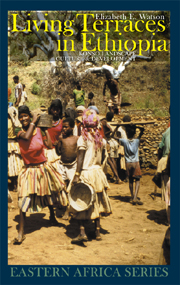Book contents
- Frontmatter
- Contents
- List of Photographs
- List of Maps, Tables & Figures
- Acknowledgements
- Foreword
- Introduction: Konso Landscape, Culture & Development
- 1 Konso Intensive Indigenous Agriculture
- 2 Social Life of Agriculture
- 3 Ritual Life of Agriculture
- 4 Political Life of Agriculture
- 5 Modernity & Christianity
- 6 Revolutionary State
- 7 Ethnic Decentralization & Self-determination
- Conclusion: Landscape, Meaning & Development
- References
- Index
5 - Modernity & Christianity
Published online by Cambridge University Press: 12 September 2012
- Frontmatter
- Contents
- List of Photographs
- List of Maps, Tables & Figures
- Acknowledgements
- Foreword
- Introduction: Konso Landscape, Culture & Development
- 1 Konso Intensive Indigenous Agriculture
- 2 Social Life of Agriculture
- 3 Ritual Life of Agriculture
- 4 Political Life of Agriculture
- 5 Modernity & Christianity
- 6 Revolutionary State
- 7 Ethnic Decentralization & Self-determination
- Conclusion: Landscape, Meaning & Development
- References
- Index
Summary
Chapters Two, Three and Four examined the way in which the production and reproduction of the landscape in Konso is part of a social, cultural, ritual and political process of which the poqallas are at the heart. The power of the poqallas rests in their control over and embodiment of forms of social, symbolic and economic capital. The study of the poqalla shows that the institutions for managing land and labour are embedded in other aspects of society to the point that the economic, the ritual, the judicial, and the political cannot be separated. This raises questions about the usefulness of the term ‘embeddedness’, often used to refer to non-economic aspects of production in economics. The term ‘embedded’ implies that the economic (or productive) practices are grounded within existing social networks and cultural beliefs and practices, from which, therefore, it could be separated. This research shows that the economic, ritual, social and political are mutually constitutive. Everyday life in Konso (and elsewhere) is made up of interactions and exchanges between people which are at once social, cultural, ritual, economic and political; it is difficult to prioritize any one dimension of an exchange over another. To separate them would be to impose dichotomies and divisions between different sectors that do not exist in practice.
The last chapter compared data from oral histories, from burial statues, and from the political events from the 1890s, to argue that the role of the poqalla in the production of the landscape is ancient.
- Type
- Chapter
- Information
- Living Terraces in EthiopiaKonso Landscape, Culture and Development, pp. 147 - 172Publisher: Boydell & BrewerPrint publication year: 2009



